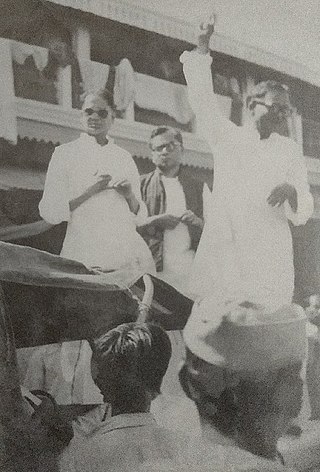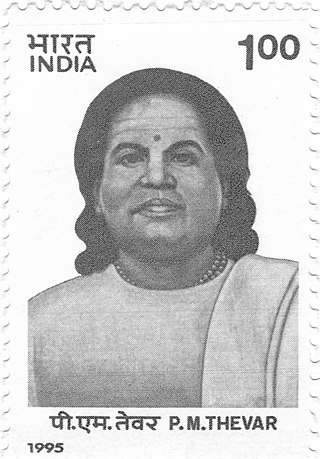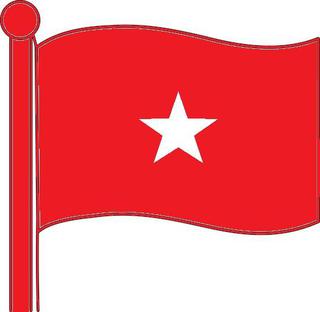Related Research Articles

The Bharatiya Janata Party is a political party in India and one of the two major Indian political parties alongside the Indian National Congress. Since 2014, it has been the ruling political party in India under the incumbent Prime Minister Narendra Modi. The BJP is aligned with right-wing politics, and its policies adhere to Hindutva, a Hindu nationalist ideology. It has close ideological and organisational links to the Rashtriya Swayamsevak Sangh (RSS) volunteer paramilitary organisation. As of September 2023, it is the country's biggest political party in terms of representation in the Parliament of India as well as state legislatures.

The Communist Party of India (Marxist) (abbreviated as CPI(M)/CPIM/CPM) is a communist political party in India. It is the largest communist party in India in terms of membership and electoral seats, beside being one of the national parties of India. The party was founded through a splitting from Communist Party of India in 1964 and it quickly became the dominant fraction.

The All India Forward Bloc is a left-wing nationalist political party in India. It emerged as a faction within the Indian National Congress in 1939, led by Subhas Chandra Bose. The party re-established as an independent political party after the independence of India. It has its main stronghold in West Bengal. The party's current Secretary-General is G. Devarajan. Veteran Indian politicians Sarat Chandra Bose and Chitta Basu had been the stalwarts of the party in independent India.

The All-India Muslim League (AIML) was a political party established in Dhaka in 1906 when some well-known Muslim politicians met the Viceroy of British India, Lord Minto, with the goal of securing Muslim interests on the Indian subcontinent.

Revolutionary Socialist Party (RSP) is a communist party in India. The party was founded on 19 March 1940 by Tridib Chaudhuri and has its roots in the Bengali liberation movement Anushilan Samiti and the Hindustan Socialist Republican Army.

The Communist Party of Pakistan is a communist party in Pakistan founded in 1948 by Sajjad Zaheer.
All India Forward Bloc (Ruikar) was a political party in India, emerging out of split from the All India Forward Bloc.

The Congress Socialist Party (CSP) was a socialist caucus within the Indian National Congress. It was founded in 1934 by Congress members who rejected what they saw as the anti-rational mysticism of Gandhi as well as the sectarian attitude of the Communist Party of India towards the Congress. Influenced by Fabianism as well as Marxism-Leninism, the CSP included advocates of armed struggle or sabotage (such as Yusuf Meherally, Jai Prakash Narayan, and Basawon Singh as well as those who insisted upon Ahimsa or Nonviolent resistance. The CSP advocated decentralized socialism in which co-operatives, trade unions, independent farmers, and local authorities would hold a substantial share of the economic power.

Ukkirapandi Muthuramalinga Thevar, also known as Pasumpon Muthuramalinga Thevar, was a politician, patriarch of Thevar community. He was elected three times to the national Parliamentary Constituency. The birth anniversary of Muthuramalinga Thevar on October 30 is celebrated annually by the Thevar community in the southern districts of Tamil Nadu as Thevar Jayanthi.
Kamal Guha (1928–2007) was an Indian politician. He was an All India Forward Bloc leader and member of the Left Front cabinet in the Indian state of West Bengal for over two decades.
The Workers and Peasants Party (WPP) (also known as the Kirti Kisan Party) was a political party in India, which worked inside the Indian National Congress in 1925–1929. It became an important front organisation for the Communist Party of India and an influential force in the Bombay labour movement. The party was able to muster some success in making alliances with other left elements inside the Congress Party, amongst them Jawaharlal Nehru. However, as the Communist International entered its 'Third Period' phase, the communists deserted the WPP project. The WPP was wound up, as its leadership was arrested by the British authorities in March 1929.

The Bolshevik Party of India is an Indian political party in India. The party was founded in 1939. The party had a certain role in the trade union movement in West Bengal and was briefly represented in the state government in 1969. In later years the party has played a negligible role in Indian politics.
Chitta Basu was an Indian politician and a leader of the All India Forward Bloc. He served as the General Secretary of the party from 1979 till his death in 1997. In his obituary, The Indian Express described Basu as belonging to the rare tribe of politicians who did politics for a cause and practiced what they preached. Barasat was his Indian Parliamentary constituency for over two decades.
Moni Guha was an Indian communist.

After power transformation, on 15 August 1947, Jawaharlal Nehru assumed office as the first Prime Minister of India and chose fifteen ministers to form the First Nehru ministry.
Satyapriya Banerjee was an Indian politician and trade unionist.

Legislative Assembly elections were held in the Indian state of West Bengal in 1996.
Sudha Roy (1914–1987) was an Indian communist trade unionist and politician. She was a prominent leader of the Bengal Labour Party, the Bolshevik Party of India and later joined the Communist Party of India. She was one of the most prominent female leaders of the Bengali left.

Legislative Assembly elections were held in the Indian state of West Bengal in 1971. The assembly election was held alongside the 1971 Indian general election.

In 1964, a major split occurred in the Communist Party of India. The split was the culmination of decades of tensions and factional infighting. When India became independent in 1947, differences arose of how to adapt to the new situation. As relations between the Nehru government and the Soviet Union improved, a faction that sought cooperation with the dominant Indian National Congress emerged within CPI. This tendency was led by S.A. Dange, whose role in the party hierarchy became increasingly controversial. When the Sino-Indian War broke out in 1962 Dange's opponents within CPI were jailed, but when they were released they sought to challenge his leadership. In 1964 the party was finally divided into two, with the left faction forming the Communist Party of India (Marxist). The split had a lot of regional variations. It also impacted other organizations, such as trade union and peasant movements. The split has been studied extensively by scholars, who have sought to analyze the various domestic and international factors involved.
References
- 1 2 3 4 5 Kāmākshīprasāda Caṭṭopādhyāẏa. Niḥśatru nāẏaka Hemanta Basu . Bāṇī Pīṭha, 1971. p. 187.
- ↑ India Who's who . INFA Publications, 2000. p. 156.
- ↑ Who's who - Issue 6 . India. Parliament. Lok Sabha · 1977. pp. 213-214.
- ↑ Muhammad Ghulam Kabir. Minority Politics in Bangladesh . Vikas, 1980. p. 17-18, 43, 87.